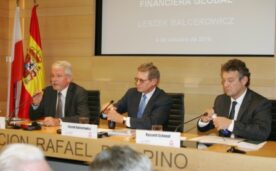The Rafael del Pino Foundation hosted Leszek Balcerowicz's Keynote Lecture "How to avoid a new global financial crisis" on 4 October 2010.
Leszek Balcerowicz stated that "Some people think that the current financial crisis is a proof of the failure of the free market system. I believe this is empirically false. Studies suggest that the ultimate reasons for this crisis lie in misguided government interventions. The origin of the crisis in the United States was the excess liquidity provided by the Federal Reserve, i.e. a public institution. The politicisation of mortgage lending through Fannie Mae or Freddie Mac is another effect of public intervention. These factors have been behind the crisis in the US, which has subsequently spread to other countries. But the nations that are suffering most severely from this crisis are also victims of their own state failures. Look at Greece: Greece is proof of the failure of governments, not the failure of markets. If you look at countries like Ireland, Spain or the UK we are talking about examples of the bursting of the housing bubble, a bubble that has been tolerated and fuelled, to some extent, by low money prices. My conclusion is that financial crises are caused by misguided public interventions. Reforms should focus on how to reduce the extent to which these interventions help to fuel them.
On the process of European integration, Leszek Balcerowicz argued that "the EU does not need grand visions without substance. This will not solve the concrete problems. Europe needs to implement the agreements reached. Take the example of the Single Market. It is the most important reform for the European economy and its growth and dynamisation, but it has not been completed, especially as far as services are concerned. The directive proposed by Commissioner Bolkestein was watered down in the European Parliament. We need progress in this area. EU members are different in terms of growth and economic development, and so there are different national policies, which, at times, should be improved. For example, Greece's problems were not generated in Brussels; they were generated in Athens. Perhaps they were tolerated by the EU, but in the end, it is the Greeks who have to solve their problems. In Portugal they have allowed years of fiscal expansion as if they were invited to the Euro banquet. And the Euro is not a banquet. It is an opportunity for countries that implement the right policies. But if they use the wrong policies, such as structural rigidities and expansionary fiscal policies, the Euro exacerbates the problems, because they run out of options. I am not saying that countries should leave the euro, which has been a success so far. What I am saying is that when you join a club, you have to observe its rules. You have to have fiscal discipline and great economic flexibility, especially when it comes to the labour market".







